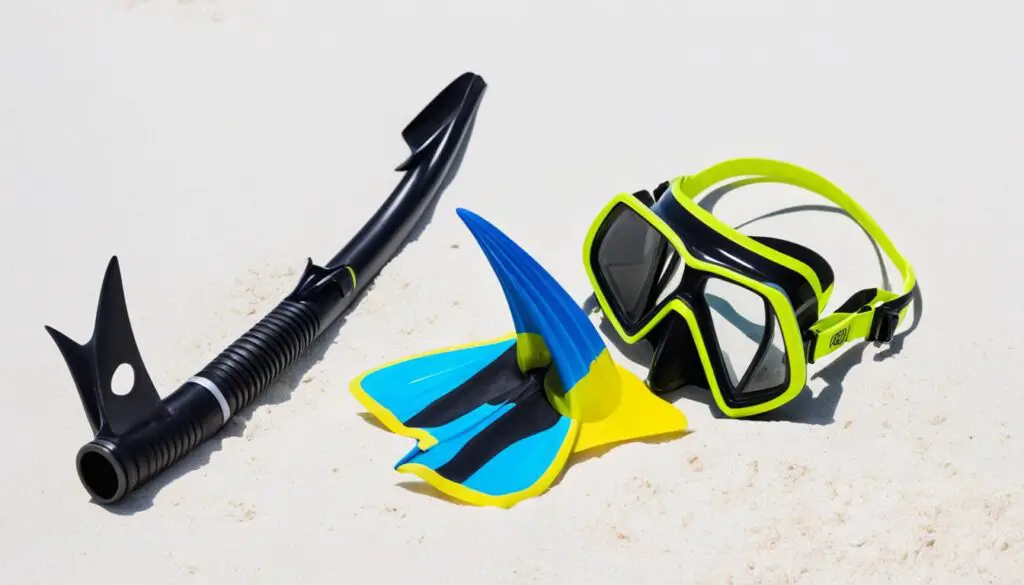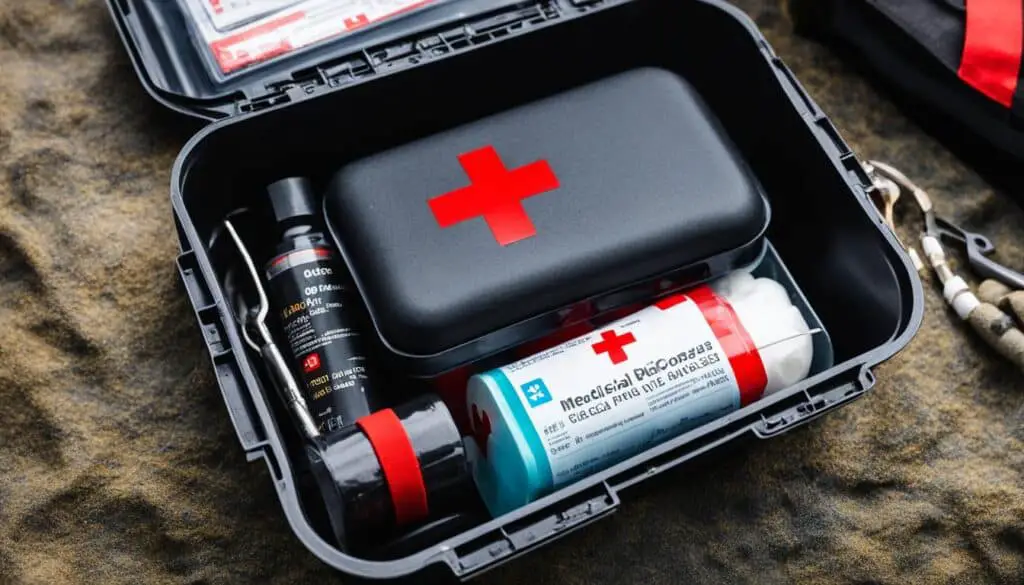When preparing for your next diving trip, it’s essential to pack wisely to ensure you have everything you need for an unforgettable underwater adventure. From safety equipment to personal gear, here are the must-have essentials that you should include in your packing list.
Key Takeaways:
- Pack essential safety equipment such as a dive computer, dive light, signaling devices, and a dive knife or cutting tool.
- Don’t forget personal gear like a wetsuit or drysuit, mask and snorkel, fins, and a weight belt.
- Consider bringing dive accessories like a camera or GoPro, a dive slate, and a dive logbook.
- Include a basic first aid kit and any necessary medication for emergencies.
- By packing these essentials, you’ll be fully prepared for your underwater adventure.
Safety Equipment
Safety should always be a top priority when diving. To ensure a safe and enjoyable underwater experience, it’s crucial to pack essential safety equipment that can help you navigate emergencies. Here are the must-have items that should be in your dive bag:
- Dive Computer: A reliable dive computer is essential for tracking your dive profile, including depth, time, and decompression limits. It helps you monitor your safety and prevent issues like decompression sickness.
- Dive Light: A dive light is essential for enhancing visibility in dim or dark underwater conditions. It allows you to explore caves, wrecks, or simply illuminate your surroundings.
- Signaling Devices: Carry signaling devices such as a whistle or surface marker buoy to alert your dive buddy or attract attention in case of an emergency. These devices can make a crucial difference in rescue situations.
- Dive Knife or Cutting Tool: A dive knife or cutting tool is a vital safety item that can be used to free yourself from entanglements or cut ropes and lines. Choose a knife with a secure sheath for easy access.
Make sure to pack and maintain these safety equipment items to stay prepared and confident throughout your dives.
Safety Equipment Checklist
| Item | Description |
|---|---|
| Dive Computer | A device for tracking dive profile, depth, and time. |
| Dive Light | A waterproof light for enhancing underwater visibility. |
| Signaling Devices | A whistle or surface marker buoy for communication and emergency signaling. |
| Dive Knife or Cutting Tool | A tool for cutting ropes, lines, and freeing from entanglements. |
With these essential safety equipment items, you can dive with peace of mind, knowing that you are well-prepared for any unforeseen circumstances.
Personal Gear
In addition to safety equipment, you’ll also need personal gear for your diving trip.
When it comes to personal gear, there are a few essential items that you should include in your diving packing list. These items will ensure your comfort, protection, and enjoyment throughout your underwater adventures.
1. Wetsuit or Drysuit
A wetsuit or drysuit is essential for maintaining optimal body temperature while diving. The choice between these two options depends on the water temperature and personal preferences. A wetsuit provides thermal insulation by trapping a layer of water against your skin, while a drysuit keeps you completely dry by sealing out water.
2. Mask and Snorkel
A high-quality mask and snorkel are crucial for clear vision and easy breathing underwater. Look for a mask with a comfortable fit, a silicone skirt to create a watertight seal, and tempered glass lenses for durability. A snorkel with a purge valve makes it easier to clear any water that enters the tube.
3. Fins
Fins are essential for efficient propulsion and maneuverability underwater. Choose fins that fit snugly but comfortably and provide the right amount of propulsion for your diving style. Opt for open heel fins if you’ll be wearing booties or closed heel fins if you’ll be diving with bare feet.
4. Weight Belt
A weight belt helps you achieve neutral buoyancy underwater by counteracting the natural buoyancy of your body and diving equipment. Determine the right amount of weight to use based on your body composition, diving experience, and exposure suit thickness.
5. Additional Gear
Depending on the water temperature and diving conditions, you may need to pack some additional gear for your personal comfort and safety. Consider the following:
- Gloves: Choose gloves made from neoprene or similar materials to keep your hands warm and protected.
- Booties: Booties provide insulation and protect your feet while walking on rocky beaches or diving from boats.
- Hood: A hood helps retain body heat and protects your head and ears from cold water.
Don’t forget to bring a dive bag to store and transport all your gear. A good dive bag should be durable, water-resistant, and spacious enough to hold your equipment securely.
With the right personal gear, you’ll be ready to explore the underwater world with confidence and comfort.
Dive Accessories
To enhance your diving experience, consider packing some essential dive accessories. These can include a dive camera or GoPro to capture your underwater adventures, a dive slate to communicate with your dive buddy, and a dive logbook to record your dives. It’s also a good idea to bring a mesh bag for collecting any trash or debris you may encounter while diving, helping to keep the ocean clean.
Having a dive camera or GoPro allows you to capture breathtaking moments and share them with friends and family. From colorful marine life to captivating dive sites, you can relive your underwater explorations whenever you want.
“Under the sea, you’ll encounter mesmerizing beauty that words alone cannot describe. With a dive camera or GoPro, you can capture moments that will last a lifetime.”
A dive slate is a handy tool that allows you to communicate with your dive buddy underwater. Whether it’s pointing out an interesting creature or indicating your air supply, a dive slate ensures clear communication when verbal communication is not possible.
In addition to capturing memories and communicating, it’s important to keep track of your dives. A dive logbook allows you to record important details such as dive locations, depths, and marine life sightings. It serves as a personal record of your diving journey and can help you plan future dives.
Lastly, it’s essential to be environmentally conscious while diving. Bringing a mesh bag allows you to collect any trash or debris that you come across, helping to preserve the ocean’s beauty and protect marine life.

| Dive Accessories | Description |
|---|---|
| Dive Camera or GoPro | Capture underwater adventures |
| Dive Slate | Communicate with dive buddy |
| Dive Logbook | Record dive details |
| Mesh Bag | Collect trash and debris |
Medication and First Aid Kit
When it comes to diving, safety and preparedness are key. That’s why it’s always a good idea to have a basic first aid kit and any necessary medication with you on your diving trip. By packing these essential items, you can ensure that you’re ready for any unexpected situations that may arise during your underwater adventure.
So, what should you include in your first aid kit? Here are some must-have items:
- Band-aids: These are essential for covering any minor cuts or scrapes that might occur while diving.
- Antiseptic ointment: Use this to clean and disinfect wounds to prevent infection.
- Seasickness medication: If you’re prone to motion sickness, it’s a good idea to have some seasickness medication on hand.
- Pain relievers: Whether it’s a headache or muscle soreness, pain relievers can provide relief from discomfort.
- Prescription medications: If you have any prescription medications that you need to take regularly, be sure to pack a sufficient supply.
In addition to the items mentioned above, it’s important to consult with your dive operator or doctor for any specific medical recommendations based on your health and diving conditions. They can provide valuable insights and advice to ensure that you’re fully prepared for your diving trip.
Remember, having a well-stocked first aid kit and necessary medication is an essential part of responsible diving. Don’t leave home without them!

Conclusion
By packing these essential items for your diving trip, you’ll be fully prepared to embark on an unforgettable underwater adventure. Prioritizing safety is crucial, so make sure to bring all the necessary personal gear, including a wetsuit or drysuit, mask and snorkel, fins, and a weight belt. Depending on the conditions, consider packing gloves, booties, and a hood to stay comfortable in the water.
Enhancing your diving experience is also important, and dive accessories can play a big role. Bring along a dive camera or GoPro to capture breathtaking moments and create lasting memories. A dive slate is handy for communicating with your dive buddy, and a dive logbook will allow you to track and record your dives, preserving the details of each adventure.
Lastly, don’t forget about your health and well-being. A first aid kit is essential, so pack items such as band-aids, antiseptic ointment, seasickness medication, and pain relievers. It’s also crucial to have any necessary prescription medications on hand. Check with your dive operator or doctor for any specific medical recommendations related to your health and the diving conditions.
With all these essentials in your dive bag, you’ll be fully equipped and ready to explore the wonders of the underwater world. Dive safely, enjoy the beauty beneath the surface, and create unforgettable memories that will last a lifetime.
FAQ
What safety equipment should I pack for my diving trip?
It is crucial to prioritize your safety when diving. Make sure to pack essential safety equipment such as a dive computer, dive light, signaling devices (whistle or surface marker buoy), and a dive knife or cutting tool. These items will help you stay prepared and ensure a safe diving experience.
What personal gear do I need for my diving trip?
In addition to safety equipment, you’ll need personal gear for your diving trip. This includes a wetsuit or drysuit, mask and snorkel, fins, and a weight belt. Depending on the water temperature and conditions, you may also need to pack gloves, booties, and a hood. Don’t forget a dive bag to store and transport all your gear.
Are there any dive accessories I should consider bringing?
Yes, bringing dive accessories can enhance your diving experience. Some essential accessories to consider include a dive camera or GoPro to capture your underwater adventures, a dive slate to communicate with your dive buddy, and a dive logbook to record your dives. It’s also a good idea to bring a mesh bag for collecting any trash or debris you may encounter, helping to keep the ocean clean.
Should I bring a first aid kit and medication on my diving trip?
Absolutely. It’s always wise to have a basic first aid kit and any necessary medication with you. Include items such as band-aids, antiseptic ointment, seasickness medication, pain relievers, and any prescription medications you may need. Remember to consult with your dive operator or doctor for any specific medical recommendations based on your health and diving conditions.
How can I ensure I am fully prepared for my diving trip?
By packing these essential items for your diving trip, you’ll be fully prepared for an unforgettable underwater adventure. Remember to prioritize safety and bring the necessary personal gear. Consider dive accessories to enhance your experience, and make sure to have a first aid kit and medication on hand. With these essentials in your dive bag, you’ll be ready to explore the wonders of the underwater world.
